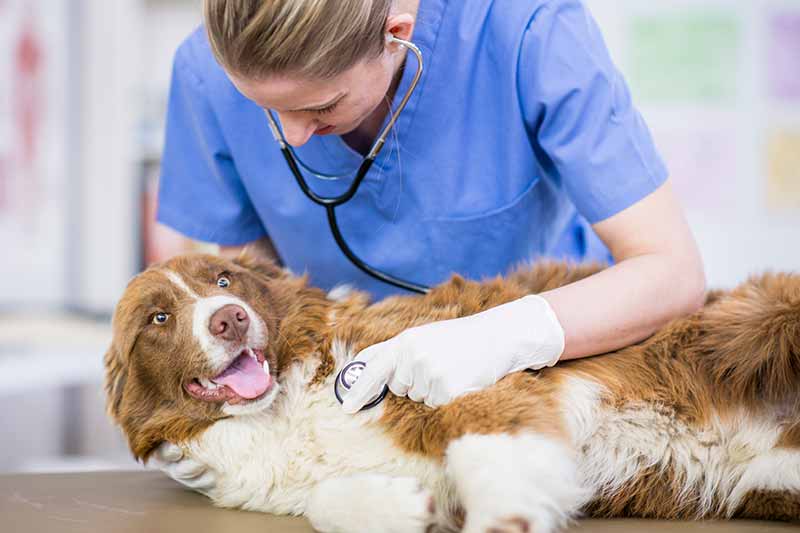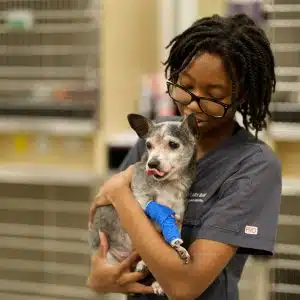Why Veterinary Oncology Services enhance treatment success
Comprehensive Guide to the Solutions Offered by a Veterinary Oncologist
Vet oncology incorporates a large selection of solutions intended at treating and diagnosing cancer cells in pet dogs. Veterinary Oncologist. Oncologists use advanced diagnostic techniques and use various therapy alternatives customized to each pet's needs. They additionally prioritize encouraging treatment and provide beneficial sources for animal owners. Recognizing these services is crucial for making notified choices. What particular facets of vet oncology can especially impact a pet dog's therapy trip?
Understanding Vet Oncology
Veterinary oncology is a customized field concentrated on treating and identifying cancer cells in pets. This self-control includes a large array of approaches, from medical treatments such as chemotherapy and immunotherapy to medical treatments intended at eliminating lumps. Vet oncologists are trained to identify the special manifestations of cancer cells in different varieties, enabling them to tailor treatment plans to specific clients.
In addition to traditional therapies, vet oncology stresses supportive care, which plays an important role in enhancing the high quality of life for affected animals. This includes discomfort management, nutritional assistance, and palliative treatment alternatives. Cooperation with pet owners is essential, as they are indispensable to decision-making regarding their animals' treatment paths. As study developments, veterinary oncology remains to evolve, using new hope and boosted end results for animals identified with cancer cells. Generally, this area is fundamental for resolving the complexities of cancer cells in buddy animals.
Advanced Diagnostic Techniques
Advanced analysis techniques play an important function in veterinary oncology, providing crucial insights into the existence and extent of cancer in animals. Imaging methods such as ultrasound, CT scans, and MRI are commonly employed to visualize lumps and evaluate their attributes. Additionally, biopsy treatments are essential for acquiring tissue samples, permitting clear-cut medical diagnosis and tailored treatment plans.
Imaging Modalities Utilized
Imaging modalities play a vital function in the medical diagnosis and monitoring of cancer cells in animals. Veterinary oncologists utilize different advanced imaging techniques to examine tumor dimension, visibility, and transition. Radiography, or X-rays, provides a preliminary sight of bone and chest conditions, while ultrasound offers real-time imaging of soft cells, permitting detailed examination of inner body organs. Calculated tomography (CT) improves visualization of intricate anatomical structures and allows 3D repairs, helping in specific lump localization. Magnetic resonance imaging (MRI) is vital for soft cells differentiation, especially in mind lumps. Furthermore, nuclear medicine methods such as positron emission tomography (PET DOG) aid identify metabolic task within tumors. Jointly, these techniques improve diagnostic precision, leading effective treatment strategies for oncological clients.
Biopsy Procedures Discussed
Adhering to the initial evaluation via imaging methods, obtaining a definitive diagnosis usually needs tissue tasting with biopsy treatments. Veterinary oncologists use various biopsy techniques based upon the lump's area and characteristics. Great needle desire (FNA) is a minimally intrusive technique that removes cells for cytological exam, suitable for superficial masses. Core needle biopsies supply larger cells samples and are helpful for much deeper lumps, allowing for histopathological evaluation. Surgical biopsies entail excising a portion or the entire tumor, facilitating extensive analysis. These treatments not just validate the presence of cancer cells but also assist identify its type and quality, assisting therapy decisions. Each biopsy method is picked meticulously to stabilize diagnostic precision with patient safety and convenience.
Treatment Alternatives for Cancer in Animals
When an animal is detected with cancer cells, a selection of treatment choices appear to assist boost and handle the disease lifestyle. Veterinary oncologists generally advise a multidisciplinary strategy customized to the specific family pet's requirements, which may include surgical procedure, radiation treatment, immunotherapy, or different treatments.
Surgery is typically used to remove growths and damaged cells, potentially leading to total remission in many cases. Radiation treatment aims to target and ruin cancer cells, lowering tumor dimension and relieving signs and symptoms - Veterinary Oncologist. Immunotherapy utilizes the animal's immune system to eliminate cancer cells better, while alternative treatments may include acupuncture or organic supplements to sustain general health and wellness
Each therapy alternative brings its own advantages and risks, and vet oncologists function closely with pet proprietors to make a comprehensive plan that straightens with the pet's details medical diagnosis and the owner's wishes. The ultimate goal is to enhance the pet dog's convenience and high quality of life throughout their cancer journey.
Radiation treatment for Animals
Chemotherapy is an usual treatment alternative for animals diagnosed with cancer cells and is typically utilized combined with various other treatments detailed by vet oncologists. This treatment includes the administration of particular medicines created to target and damage cancer cells, thereby lowering lump dimension and stopping the spread of the disease. Vet oncologists tailor radiation treatment procedures based on the kind of cancer, the animal's overall health and wellness, and the desired treatment end result.
Adverse effects can take place, as these medications might also impact healthy and balanced useful content cells. Usual reactions consist of nausea, throwing up, and momentary adjustments in cravings - Veterinary Cancer Specialist. Veterinary oncologists are geared up to manage these side results successfully, making sure the family pet's comfort throughout the treatment process. Regular surveillance through blood examinations and follow-up appointments is crucial to assess the pet dog's reaction to chemotherapy and make required modifications. Ultimately, chemotherapy can provide considerable advantages, boosting the lifestyle for family pets facing cancer medical diagnoses

Radiation Treatment in Veterinary Medicine
Radiation treatment functions as an efficient treatment choice for pets identified with local tumors, providing a targeted technique to cancer administration. This strategy uses high-energy radiation to harm the DNA of cancer cells, preventing their capability to multiply. It is especially useful for tumors that are not amenable to medical removal or for cases where surgical procedure might not be possible due to the lump's area.
Veterinary oncologists tailor radiation procedures based on growth kind, size, and place, along with the pet's general health and wellness. Therapy can be supplied via exterior light beam radiation or brachytherapy, each with distinct benefits. my website Usually, numerous sessions are required to make the most of efficiency while minimizing negative effects.
Although pet dogs might experience temporary reactions such as skin inflammation, the total aim is to shrink growths and ease signs and symptoms, ultimately improving the animal's prognosis and lifestyle. Accordingly, radiation therapy plays a vital function in complete cancer cells treatment.
Palliative Care and High Quality of Life
Palliative care in veterinary oncology focuses on enhancing the lifestyle for pets encountering incurable ailments, making certain convenience and dignity in their final days. This specialized approach focuses on discomfort administration, sign control, and emotional assistance. Vet oncologists examine each family pet's private needs, customizing treatments to minimize discomfort and boost general wellness.
Techniques might include administering drugs for discomfort alleviation, taking care of queasiness, and addressing various other traumatic signs. Additionally, dietary support is frequently provided to preserve strength and boost hunger. The emotional element of palliative care is just as essential; creating a tranquil environment helps in reducing anxiousness for both family pet and owner.
Inevitably, the goal of palliative treatment is to allow family pets to enjoy their continuing to be time with as much delight and self-respect as possible. By focusing on comfort and top quality of life, veterinary oncologists play an essential duty in guaranteeing that pets and their family members navigate this tough journey with compassion and understanding.
Assistance for Pet Owners Throughout Treatment

Psychological Assistance for Proprietors
Charting the emotional landscape during a pet dog's cancer therapy can be an overwhelming experience for owners. The unpredictability surrounding medical diagnosis and diagnosis can result in sensations of unhappiness, anxiousness, and helplessness. Vet oncologists recognize the significance of psychological support and usually offer advice to help owners browse this difficult trip. Interaction is necessary; discussing treatment alternatives and potential results can minimize some fears. In addition, offering peace of mind that emotional feedbacks are legitimate fosters a helpful atmosphere. Lots of oncology facilities might likewise recommend support system or therapy solutions customized for family pet proprietors, promoting common experiences. Urging proprietors to focus on self-care throughout this moment is essential, as their psychological health straight affects their family pet's comfort and general treatment experience.

Resources and Educational Products
Steering through the intricacies of a pet dog's cancer treatment can be frightening for owners, making access to reliable sources and academic materials necessary. Veterinary oncologists frequently give a variety of handouts, pamphlets, and online materials that clarify therapy options, potential negative effects, and treatment strategies. These sources help debunk the procedure and empower family pet owners to make informed decisions. Additionally, several oncology centers provide access to sustain groups and online forums where proprietors can get in touch with others encountering comparable obstacles, promoting a feeling of neighborhood. Educational webinars and workshops conducted by vet professionals better enhance understanding, making sure that owners are fully equipped to browse their pet's trip via cancer treatment with self-confidence and knowledge.
Often Asked Inquiries
How Can I Prepare My Family Pet for a Vet Oncology Check Out?
Preparing a pet for a veterinary oncology see entails gathering medical documents, keeping in mind signs and symptoms, and guaranteeing the family pet fits. A calm attitude and familiar items can assist reduce anxiety during the consultation.
What Are the Signs My Pet Dog May Have Cancer Cells?
Signs that an animal might have cancer cells consist of unexplained fat burning, persistent vomiting or looseness of the bowels, uncommon lumps or swellings, sleepiness, changes in appetite, problem breathing, and changes in habits. Trigger veterinary attention is crucial.
How Can I Assistance My Pet Dog Emotionally During Therapy?
Sustaining a pet dog emotionally during treatment includes giving convenience, maintaining routines, supplying gentle affection, and making sure a tranquil atmosphere. Involving in silent play and normal friendship helps minimize stress and anxiety and cultivates a complacency.
Are There Alternate Treatments for Family Pets With Cancer?
Different treatments for pet dogs with cancer cells consist of acupuncture, organic therapies, and dietary support. These methods may complement traditional treatments, promoting overall health. Consulting with a vet is necessary for risk-free and efficient integration of alternative treatments.
What Expenses Should I Anticipate for Vet Oncology Providers?
The awaited expenses for vet oncology services can differ significantly, frequently affected by diagnostics, treatments, and recurring care. Pet proprietors should get ready for expenses varying from consultations to specialized treatments, reflecting the complexity of cancer cells management.
Cooperation with pet proprietors is essential, as they are indispensable to decision-making regarding their family pets' therapy paths. Each therapy alternative carries its very own advantages and risks, and veterinary oncologists function closely with family pet proprietors to design a detailed plan that lines up with the pet dog's particular medical diagnosis and the proprietor's wishes. Animals might experience short-lived reactions such as skin irritability, the total objective is to diminish lumps and alleviate signs, inevitably boosting the pet's prognosis and high quality of life. Assistance for family pet proprietors during treatment is crucial in guiding via the emotional challenges connected with a family pet's cancer cells medical diagnosis. Preparing a pet dog for a vet oncology visit involves gathering medical records, noting signs, and guaranteeing the family pet is comfy.